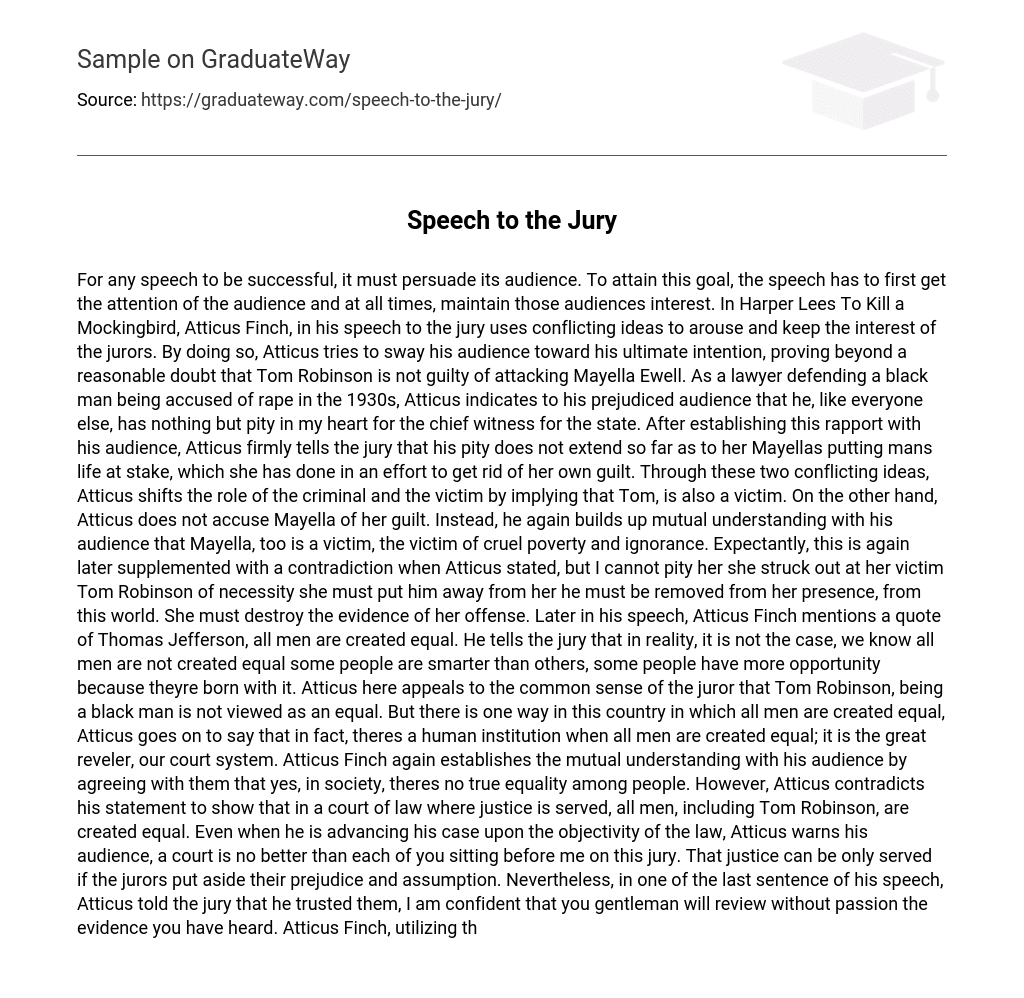To achieve success, a speech must convince its audience. To do this, the speech must first capture and continuously engage their interest. In Harper Lee’s To Kill a Mockingbird, Atticus Finch uses conflicting ideas in his address to the jury to captivate and maintain their attention. Through this approach, Atticus aims to persuade his audience towards his ultimate goal of proving Tom Robinson’s innocence beyond a reasonable doubt in the case of Mayella Ewell’s attack. As a lawyer defending a black man accused of rape during the 1930s, Atticus acknowledges to his biased audience that he shares their sympathy for the main witness for the prosecution.
Atticus establishes a rapport with his audience and then firmly states that he does not pity Mayella enough to excuse her actions which endanger a man’s life. He suggests that Tom, the accused, is also a victim. However, Atticus does not directly accuse Mayella of her guilt but instead presents her as a victim of poverty and ignorance.
Atticus Finch initially expresses understanding and sympathy towards Mayella Ewell’s actions against Tom Robinson, acknowledging her need to remove him from her life. He considers it a necessary step to eliminate any proof of her wrongdoing. However, he later contradicts this viewpoint by referring to a quote from Thomas Jefferson that declares the equality of all men. Atticus clarifies that this statement does not align with our current reality, as certain individuals possess greater intelligence and privilege due to their inherent qualities or circumstances. By appealing to the jurors’ common sense, Atticus asserts that Tom Robinson is not seen as an equal because he is a black man.
Atticus Finch addresses the issue of equality in society and argues that the only place where true equality exists is within our court system. He acknowledges that outside of the courtroom, there is no true equality among individuals. However, Atticus asserts that in a court of law, all individuals, including Tom Robinson, are considered equal. He emphasizes the importance of objectivity in the pursuit of justice and warns the jury that they must put aside their prejudice and assumptions. Despite this cautionary note, Atticus expresses his trust in the jurors to review the evidence without bias or emotion.
Atticus Finch skillfully employed contrasting concepts in his speech to the jurors, thereby emphasizing their responsibility and motivation. Throughout his discourse, Atticus highlighted the paradoxical aspects of Mayella Ewell’s character, attributes, and behaviors. Moreover, he emphasized the importance of equal treatment among people and the integrity of both the court and the jury system. These conflicting ideas captivated the audience’s attention and successfully convinced them of Tom Robinson’s innocence. Paradoxically, despite failing to persuade his listeners that Tom did not assault Mayella, Atticus’s effective utilization of contradictory notions ultimately achieved the desired outcome.





